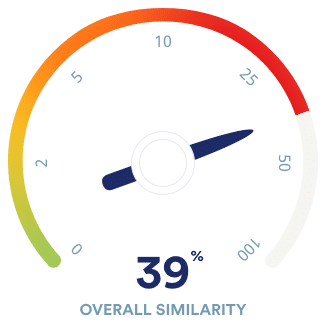
This introduction to a literary analysis essay, about Mary Shelley’s Frankenstein, starts by describing a simplistic popular view of the story, and then states how the author will give a more complex analysis of the text’s literary devices.
The length of each part depends on the length and complexity of your essay.
This introduction example is taken from our interactive essay example on the history of Braille.
A thesis statement is a sentence that sums up the central point of your paper or essay. Everything else you write should relate to this key idea.
Well done!
Example: Signposting This essay begins by discussing the situation of blind people in nineteenth-century Europe. It then describes the invention of Braille and the gradual process of its acceptance within blind education. Subsequently, it explores the wide-ranging effects of this invention on blind people’s social and cultural lives.
This introduction to an argumentative essay sets up the debate about the internet and education, and then clearly states the position the essay will argue for.
A good introduction paragraph is an essential part of any academic essay. It sets up your argument and tells the reader what to expect.
Mary Shelley’s Frankenstein is often read as a crude cautionary tale. Arguably the first science fiction novel, its plot can be read as a warning about the dangers of scientific advancement unrestrained by ethical considerations. In this reading, and in popular culture representations of the character as a “mad scientist”, Victor Frankenstein represents the callous, arrogant ambition of modern science. However, far from providing a stable image of the character, Shelley uses shifting narrative perspectives to gradually transform our impression of Frankenstein, portraying him in an increasingly negative light as the novel goes on. While he initially appears to be a naive but sympathetic idealist, after the creature’s narrative Frankenstein begins to resemble—even in his own telling—the thoughtlessly cruel figure the creature represents him as.

For each text you read, you want to be able to lift out an abstract (a bullet-point summary of the gist, including controversies), several bites (direct quotations lifted from the text, with page numbers), and a citation (the full reference for the text you’re reading).
"Academic English is something that you refine throughout an academic career, as you read more academic pieces, receive more feedback, and get more practice."
This way, you can get ten times more reference material than if you’d been comprehensive. It may sound dismissive, but when the deadline is tight, then efficiency is everything.
Now you are clear about what the question is asking of you, you may be ready to write your academic essay. If the essay requires nothing more than your own existing knowledge (usually the case in exams), then you’re good to go – or at least to plan!
How do I read my research?

The STOP approach:
Sources: own knowledge of psycholinguistics (secondary), provided transcript (primary)
Topic: non-standard English in children’s language acquisition
Orientation: focus on non-standard utterances only
Purpose: analyse, theorise, explain
This question, that logically follows from the question of how to read, is simple to answer… as simple as ABC:
The system is as follows:
SOURCES.
Where should the knowledge come from? Is a primary source given? Is a reading list provided?

Finding a seamless method to present an alternative perspective or theory can be hard work, but these terms and phrases can help you introduce the other side of the argument. Let's look at some examples:
And be sure to reference correctly too, when using quotes or paraphrasing someone else's words.
Your summary should include the most relevant information or research factor that guided you to your conclusion. Contrary to words such as “persuasive” or “compelling”, these essay words are helpful to draw attention to an important point. For example:
If this is you, and you've come here looking for words and phrases to use in your essay, you're in the right place. We’ve pulled together a list of essential academic words you can use in the introduction, body, and conclusion of your essays.
11. Importantly

Even though we recommend the use of these phrases, DO NOT use them too often. You may think you sound like a real academic but it can be a sign of overwriting!
Here are some examples:
The dissociation of tau protein from microtubules destabilises the latter resulting in changes to cell structure, and neuronal transport. Moreover, mitochondrial dysfunction leads to further oxidative stress causing increased levels of nitrous oxide, hydrogen peroxide and lipid peroxidases.
Complement complex ideas with simple descriptions by using these sentences. These are excellent academic phrases to improve the continuity of your essay writing. They should be used to explain a point you’ve already made in a slightly different way. Don’t use them to repeat yourself, but rather to elaborate on a certain point that needs further explanation. Or, to succinctly round up what just came before.
89% of respondents living in joint families reported feeling financially secure. Conversely, only 64% of those who lived in nuclear families said they felt financially secure.

Note that these two methods can be combined
In the block method, you cover each of the overall subjects you’re comparing in a block. You say everything you have to say about your first subject, then discuss your second subject, making comparisons and contrasts back to the things you’ve already said about the first. Your text is structured like this:
- The alternating method, where you compare your subjects side by side according to one specific aspect at a time.
- The block method, where you cover each subject separately in its entirety.
Comparing and contrasting is an important skill in academic writing. It involves taking two or more subjects and analyzing the differences and similarities between them.
When should I compare and contrast?
Mouse over the example paragraph below to see how this approach works.
- Subject 1
- Point of comparison A
- Point of comparison B
- Subject 2
- Point of comparison A
- Point of comparison B
The most commonly cited advantage of distance learning is the flexibility and accessibility it offers. Rather than being required to travel to a specific location every week (and to live near enough to feasibly do so), students can participate from anywhere with an internet connection. This allows not only for a wider geographical spread of students but for the possibility of studying while travelling. However, distance learning presents its own accessibility challenges
Comparing and contrasting is also a useful approach in all kinds of academic writing: You might compare different studies in a literature review, weigh up different arguments in an argumentative essay, or consider different theoretical approaches in a theoretical framework.

“A theory can be proved by experiment, but no path leads from experiment to the birth of a theory.”
The wording “not only… but also” is a useful way to elaborate on a similarity in your arguments but in a more striking way.
Another way to add contrast is by highlighting the relevance of a fact or opinion in the context of your research. These academic words help to introduce a sentence or paragraph that contains a very meaningful point in your essay.
Finding a seamless method to present an alternative perspective or theory can be hard work, but these terms and phrases can help you introduce the other side of the argument. Let's look at some examples:
4. Moreover

These essay phrases are useful to begin your essay. They help you pose your argument based on what other authors have said or a general concern about your research. They can also both be used when a piece of evidence sheds new light on an argument. Here’s an example:
The result of the American invasion has severely impaired American interests in the Middle East, exponentially increasing popular hostility to the United States throughout the region, a factor which has proved to be a powerful recruitment tool for extremist terrorist groups (Isakhan, 2015). Considering [or In light of / In view of] the perceived resulting threat to American interests, it could be argued that the Bush administration failed to fully consider the impact of their actions before pushing forward with the war.
On the data of this trial, no treatment recommendations should be made. The patients are suspected, but not confirmed, to suffer from pneumonia. Furthermore, five days is too short a follow up time to confirm clinical cure.
As Einstein often reiterated, experiments can prove theories, but experiments don’t give birth to theories.
